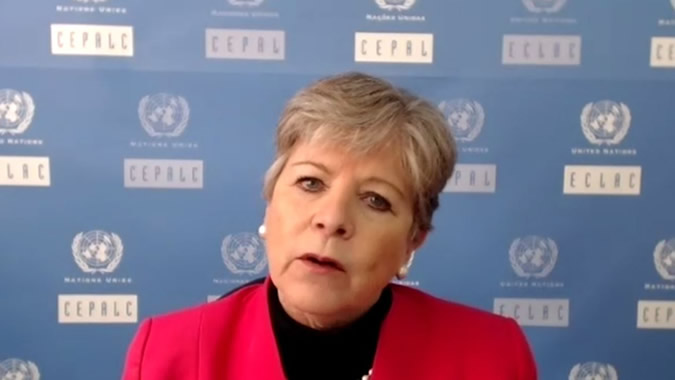The Region Requires a New Political Compact that Ensures Universal Social Protection and Resolves Structural Problems in the World of Work
Work area(s)
ECLAC’s Executive Secretary, Alicia Bárcena, participated today in the book launch of The future of work: Trade unions in transformation, published by the Bureau for Workers’ Activities of the International Labour Organization (ILO).

The coronavirus (COVID-19) pandemic has deepened structural problems in the world of work, which will lead to an increase in unemployment, poverty and inequality. For that reason, countries need a new political compact that ensures universal social protection for all the region’s workers, women and men alike, Alicia Bárcena, Executive Secretary of the Economic Commission for Latin America and the Caribbean (ECLAC), sustained today.
The senior United Nations official participated in the launch of the book entitled The future of work: Trade unions in transformation, published by the Bureau for Workers’ Activities (ACTRAV) of the International Labour Organization (ILO).
Participating along with Alicia Bárcena were Maria Helena André, Director of ILO ACTRAV; Rafael Freire Neto, Secretary of Political Economy and Sustainable Development at the Trade Union Confederation of the Americas (TUCA); Gerardo Martínez, Foreign Affairs Secretary of the General Confederation of Labor of the Republic of Argentina; and Rosa Flerez, Secretary General of the Confederation of Workers of Colombia. Serving as moderator was Amanda Villatoro, the official in charge of ILO ACTRAV for Latin America and the Caribbean.
During her presentation, Alicia Bárcena warned that the pandemic has deepened the structural problems affecting the world of work. She specified that 54% of Latin American workers are informal, while 20.6% of employed people live in poverty and 5.7% in extreme poverty.
She added that the pandemic’s impact has entailed significant gender inequality. Women are less likely to work, have a higher unemployment rate and are overrepresented in poor-paying jobs that provide no protection. In fact, 60% of women work in informal sectors.
In addition, 20% of young people neither work nor receive an education or training, and many workers do not have the right to form trade unions or participate in them: in 20 out of 25 countries, there are limits on the right to collective bargaining, she noted.
ECLAC’s Executive Secretary recalled that the region will suffer a -9.1% drop in GDP in 2020, the worst in 100 years, and a -23% plunge in trade, with sharply negative effects on the labor market.
“We see reduced hours, lower wages and dismissals in formal employment, where around 9 million jobs could be lost. In the informal sector, meanwhile, there is a decline in employment due to social distancing and bans on movement, and less access to income compensation,” she specified.
She added that the destruction of companies as a result of the pandemic will severely affect formal employment (34%). According to ECLAC’s estimates, she said, 2.7 million companies will close in the region, 2.6 million of which are microenterprises. The most affected sectors will be commerce, with a loss of 2.4 million companies and 4 million formal jobs, and tourism, which will lose at least 290,000 companies and 1 million jobs.
Alicia Bárcena warned that the pandemic will affect 44 million people as the unemployment rate rises to 13.5%. She also noted that in the lower strata, 76.2% of workers are not affiliated with a pension system and that 8 out of every 10 Latin Americans do not earn more than $500 dollars per month.
To address the harsh social impact of the crisis, ECLAC proposes implementing an emergency basic income equivalent to one poverty line ($147 dollars) for six months, at a cost of 1.9% of GDP, along with an anti-hunger grant equivalent to 70% of one extreme poverty line ($57 dollars), which would cost 0.45% of GDP. The Commission also recommends longer repayment periods and grace periods for credits to Micro, Small and Medium-sized Enterprises (MSMEs) and partial co-financing of the payroll; conditional support for at-risk big companies in strategic sectors; expansive and progressive fiscal and monetary policies; and cooperation for financing under favorable conditions.
It also proposes a political compact for a welfare State and universal, progressive and distributive social policies aimed at dismantling the culture of privilege.
In addition, ECLAC’s highest authority warned that 16% of jobs in the region are at high risk of technological substitution. However, she indicated, the new technologies can open spaces for creating new jobs in the very introduction of these technologies, in the emergence of new goods and services, and in new business models.
“We have to ensure that the positive impact of technological and digital changes in the working world serves to benefit workers. A renewed social dialogue is needed to develop labor regulations and adapt them to this new context, taking advantage of these technologies and making sure they do not produce more precariousness,” she underscored.
Finally, Alicia Bárcena stressed that the post-pandemic recovery must be different, with a new development model and a social and political compact that includes a new equation between a social State, the market and society, to attain a universal system for social protection and access to basic public goods.
“We are at a civilizing crossroads where we must strengthen the labor movement and trade unions, because there is no doubt that work is the master key for overcoming inequality and emerging from this pandemic,” she concluded.
Type
Country(ies)
- Latin America and the Caribbean